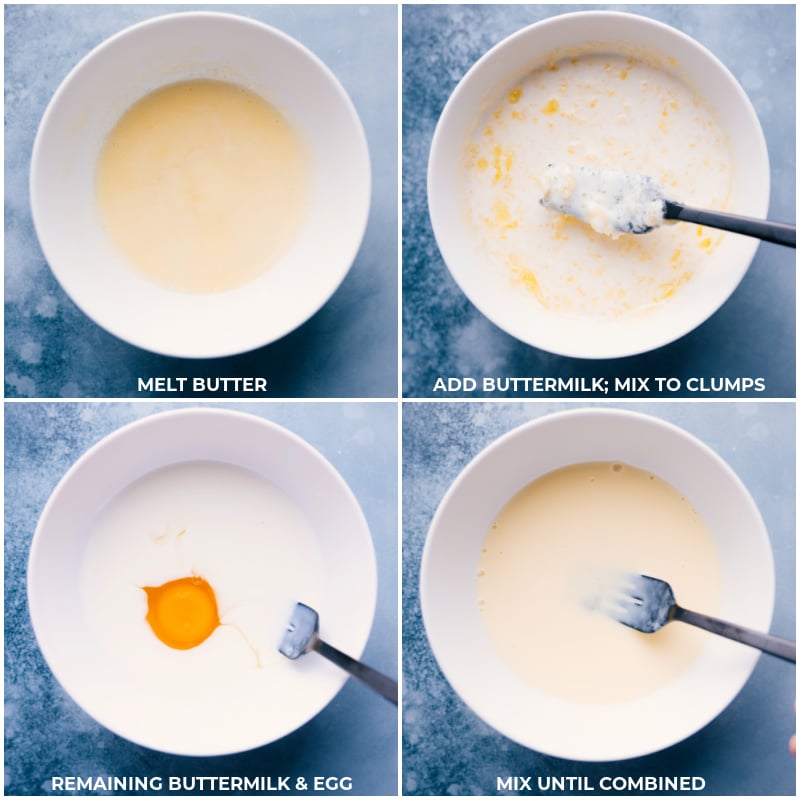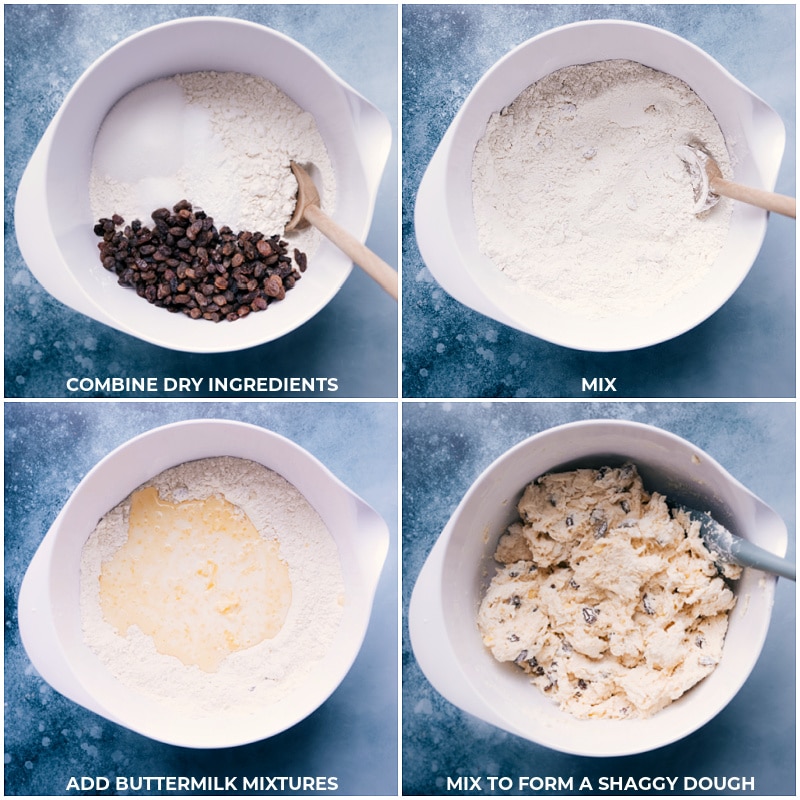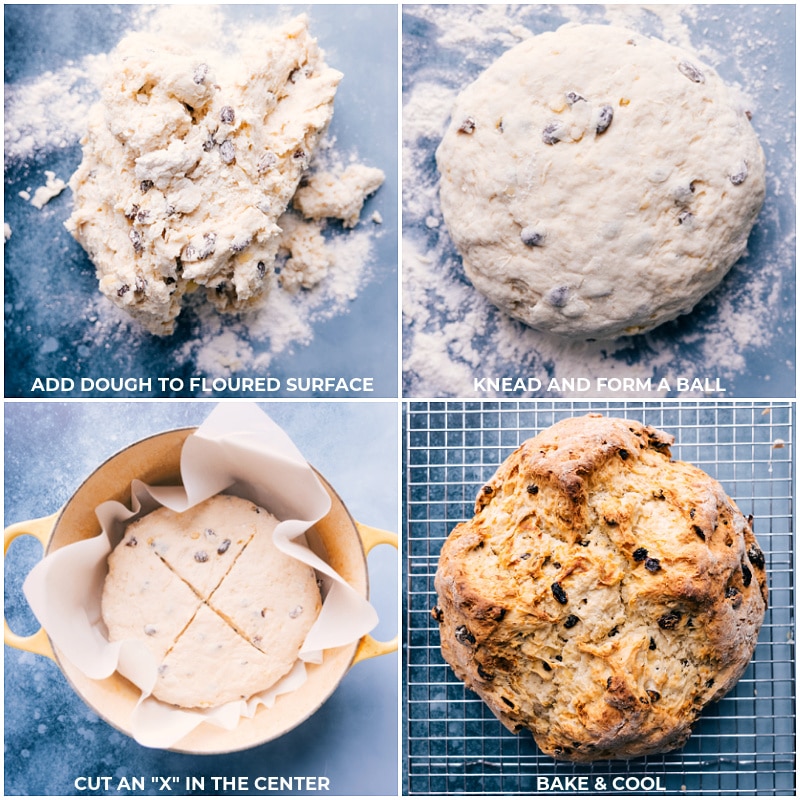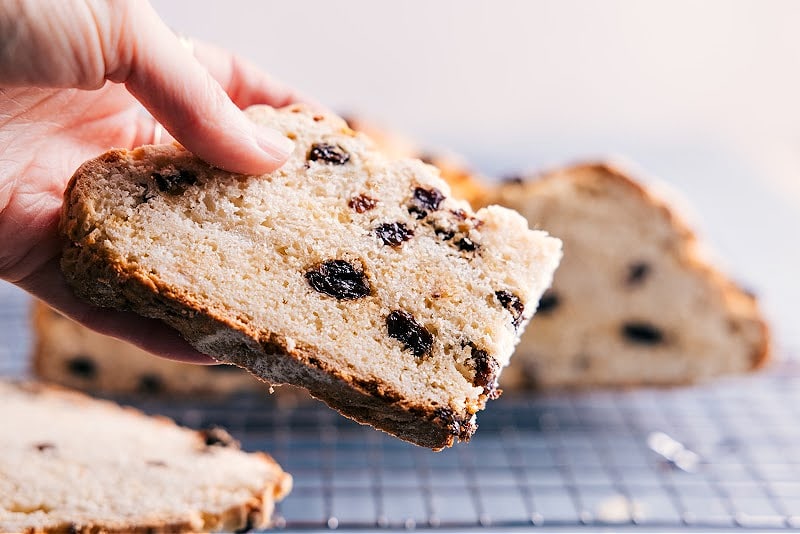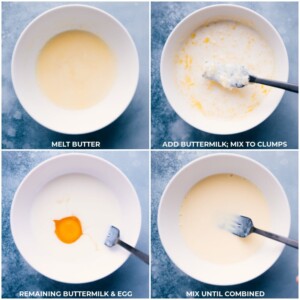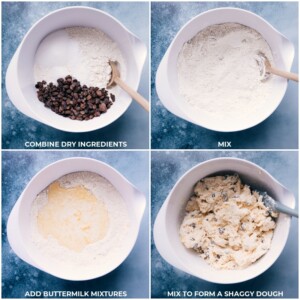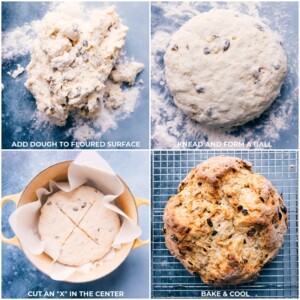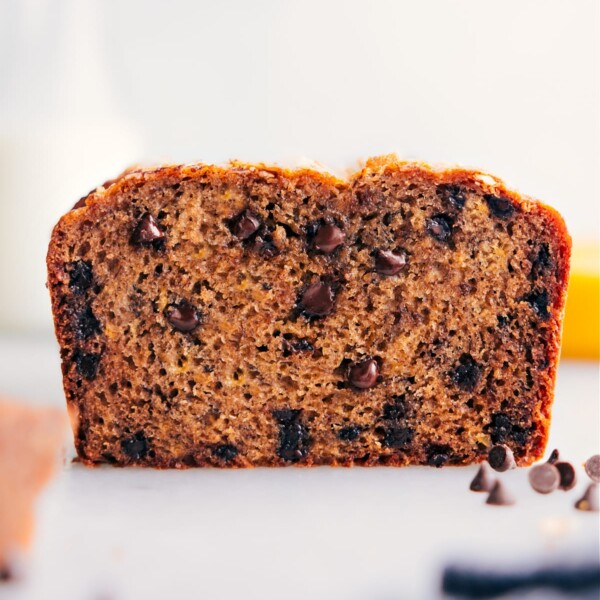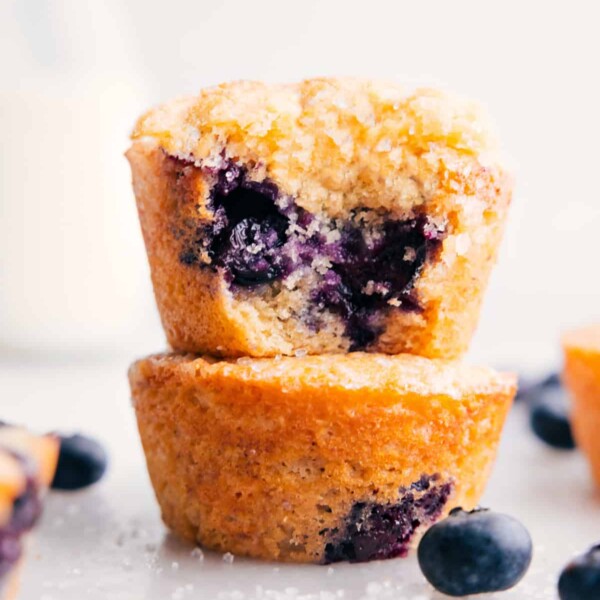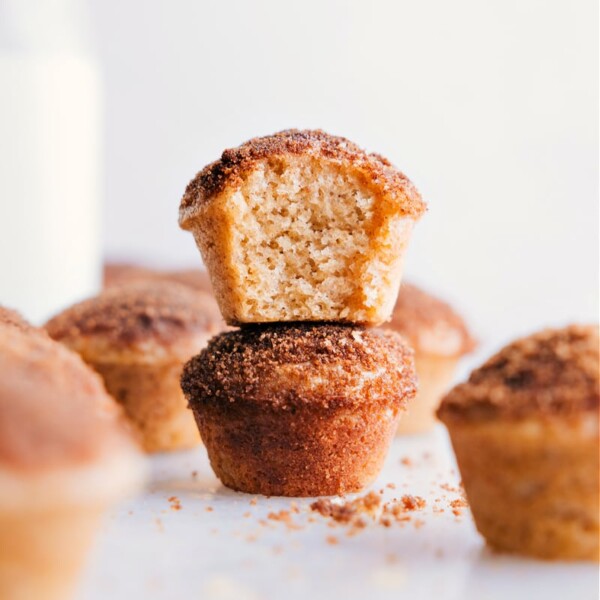Our favorite Irish Soda Bread can be whipped together in a matter of minutes and doesn’t require any rising time (no yeast!). Add in some raisins or sunflower seeds for a tasty addition or leave them out for plain soda bread.
This Irish Soda Bread is not only easy to make, but it’s also very quick to whip together — in fact, there is no rising time needed. We add everything into a large bowl and mix it together with a wooden spoon and/or spatula (no hand or stand mixers required!)
If you’re looking for a yeasted bread check out our White Bread recipe, Honey Whole Wheat Bread recipe, or our delicious Dinner Rolls.
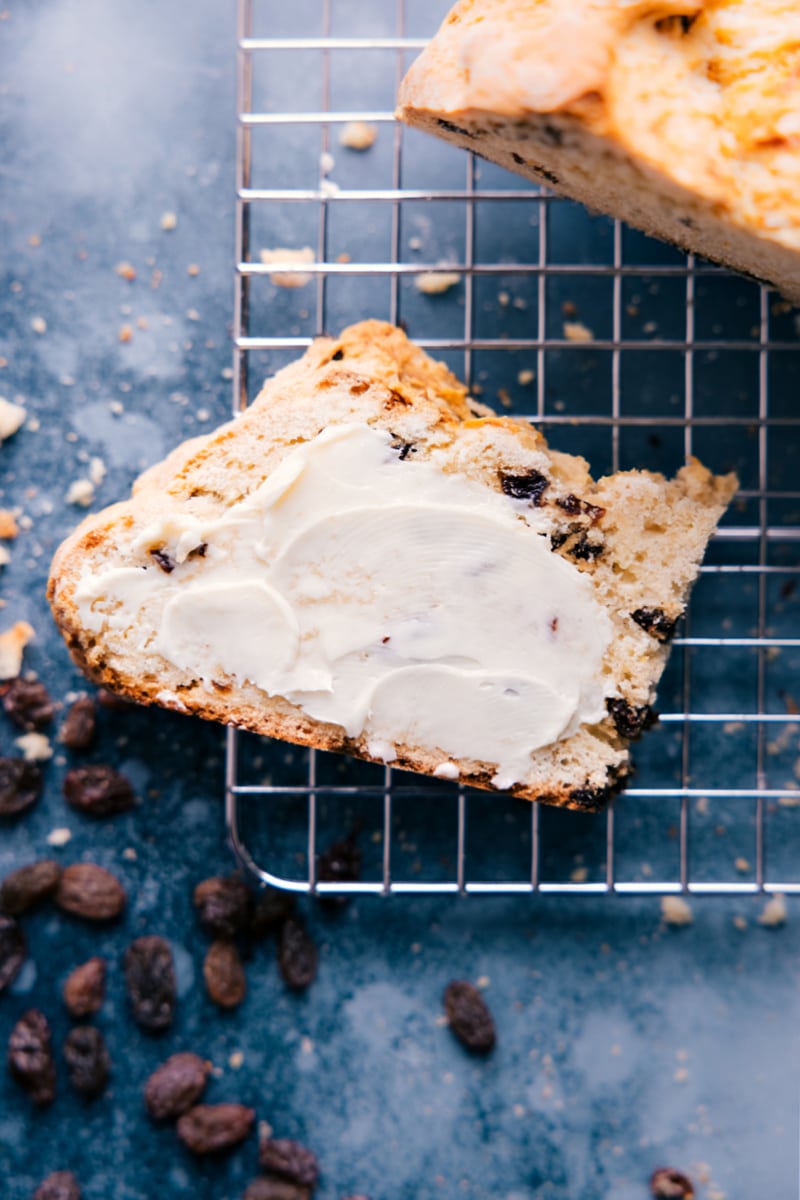
Irish Soda Bread Recipe
When we put up a poll on Instagram asking how you all feel about raisins in bread, the majority was against the addition. While I don’t like raisins anywhere near my Oatmeal Cookies, they are ridiculously tasty in a good bread! And while I’d love to convince you all to give it a go, I respect that it’s a deal breaker for so many people. But with that said, don’t discount this Irish Soda Bread recipe just yet, because there are loads of different options you can use in place of the raisins!
Variations
- Leave out the raisins and prepare the bread as is (plain white no-yeast bread!).
- Add some seeds — mix through about 1/3 up to 1/2 cup of poppy seeds, sunflower seeds, or sesame seeds into the dough and then sprinkle another tablespoon on top before baking.
- Brush the top of the bread with buttermilk and sprinkle with old-fashioned oats.
Irish Soda Bread FAQs
What is Irish Soda Bread?
Irish Soda Bread is a quick bread without yeast, similar to zucchini bread or banana bread, and doesn’t need rising time. It rises due to the reaction between the acids in buttermilk and the baking powder and soda, resulting in a nice rise without yeast!
How To Serve Irish Soda Bread?
Cut it into slices and serve it warmed! We like it served with some room temperature butter and jam (or a citrus marmalade).
It’s also great served as a dipping accompaniment to a hearty stew or soup!
What does Irish Soda Bread taste like?
This bread has an overall mild flavor with a buttery richness and a subtle sweetness from the raisins. The flavor is most similar to a biscuit.
While we love this bread plain, it is definitely next level served with butter or jam — it’s not necessarily intended to be eaten on its own.
How To Make Irish Soda Bread
Remember the “secret” preparation method for creating these amazing Drop Biscuits?
Quick re-cap: Most drop biscuits use cold cubed butter and a food processor or pastry blender to cut the butter into the biscuits. But instead, we actually melt the butter. This would normally be bad for the texture, but we form new butter clumps by mixing in cold buttermilk. When the cold buttermilk hits the melted butter, it forms small clumps (see the photo above). Those clumps will imbue the wonderful texture that results from pockets of butter without the extra work. (Thanks to Cooks Illustrated for teaching me this cool trick!)
We use this method again in this Irish Soda Bread Recipe — we mix hot melted butter with cold buttermilk and get perfect clumps of butter. This not only helps the bread rise, but it will also give it a great texture. And, it’s SO much easier than cutting in cold butter!
Irish Soda Bread Recipe Tips
- Adding flour to the dough: Humidity, altitude, and temperature can all affect how much flour you’ll need. Aim to add only enough flour to be able to manage the dough, because the wetter/stickier the dough the more moist (and tasty!) the bread will be. On the flip side, if it is too wet and sticky to manage, it will spread too much/not have enough structure.
- Cut an “X” in the loaf before baking. This helps to ensure the middle is cooked through. In southern Irish regions, the cross was added for superstitious reasons — families believed the cross would let the fairies out or ward off evil and protect their homes! (PS: That’s how the term ‘hot cross buns’ originated: from the superstitious cross put on the loaves!)
- Let baked bread stand. Once you remove it from the oven, allow time for the bread to stand on the sheet pan for about 5-10 minutes and then on a wire cooling rack for at least 30 minutes. The residual heat and steam ensure the inside is fully baked through. As tempting as it is to cut in, don’t rush it because you’ll likely end up with a slightly doughy center.
How To Serve Irish Soda Bread
- Slice a piece while the bread is still hot and spread on a thick layer of room temperature butter. If the butter is unsalted, add a pinch of salt on top.
- Add a citrus marmalade or berry jam. If the bread isn’t fresh out of the oven, toast a slice first.
- Make a sandwich with it! Add your favorite cheese and meat or prepare an open-faced sandwich with toasted bread and cheese!
- Use for French toast. Top with plenty of vanilla sauce, pancake syrup or blueberry syrup.
- Dunk in some soup or a hearty stew — here’s a list of 30 or our favorite soup recipes. We especially love this Irish Soda Bread dunked in this Minestrone Soup, Instant Pot Beef Stew, or this gnocchi-filled Crockpot Beef Stew.,
Storage
Storing Irish Soda Bread
This bread is best enjoyed fresh on the same day it’s made, but it stores well too. Without preservatives, it won’t last as long as store-bought bread, but you’ll probably finish it quickly!
Store leftover bread at room temperature in a cool, dry place for up to 3 days, ideally in a container with some ventilation to let it breathe. Avoid heat and humidity to prevent mold. Don’t refrigerate it, as the dry air will make it stale faster. Keep it soft by using an airtight plastic bag once it’s fully cooled.
For any bread left after 2-3 days, freeze it for up to 3 months. Slice it before freezing and take out what you need. You can toast slices straight from the freezer or thaw them at room temperature.
Quick Tip
Irish Soda Bread is notoriously crumbly, so cut long slices in half down the middle and then toast the bread first for more stability.
Use Leftover Buttermilk In One Of These Recipes:
- Homemade Pancakes with a hint of cinnamon
- Corn Casserole with creamed corn
- Chocolate Chip Pancakes or these Blueberry Pancakes
- Buttermilk Syrup perfect for topping pancakes, French toast, or other breakfast favorites
- Red Lobster Biscuits with sharp Cheddar cheese
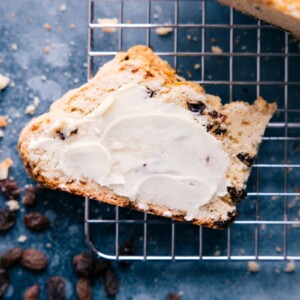
Irish Soda Bread
Ingredients
- 1/2 cup unsalted butter, melted
- 1-3/4 cups buttermilk separated (Note 1)
- 1 large egg
- 4-1/2 cups white all-purpose flour, plus more for dusting (Note 2)
- 3 tablespoons white granulated sugar
- 2-1/2 teaspoons baking powder
- 1 teaspoon baking soda
- 1-1/2 teaspoons fine sea salt
- 1 cup soft (fresh) raisins
Instructions
- PREP: Preheat oven to 425 degrees F. Line a large sheet pan with parchment paper or a silpat liner OR line a 5-quart cast-iron pot with parchment paper. Set aside. Melt butter in a medium-sized microwave-safe bowl.
- LIQUIDS: Take the butter from the microwave and pour in 1 cup (237g) cold buttermilk. Stir with a fork and set aside for about 5 minutes. In another medium-sized bowl add the remaining 3/4 cup (176g) buttermilk and the large egg. Whisk together until smooth and set aside.
- DRY INGREDIENTS: Add 4-1/2 cups flour, 3 tablespoons sugar, 2-1/2 teaspoons baking powder, 1 teaspoon baking soda, 1-1/2 teaspoons salt, and 1 cup raisins to a very large bowl. Whisk together until combined. Make a well in the middle of the bowl and pour in the buttermilk + egg mixture.Stir the butter and buttermilk mixture again, stirring until small clumps form (we want this mixture as clumpy as possible!). Use a spatula to scrape every bit of this mixture on top.
- MIX: Use a strong spatula or wooden spoon to mix ingredients until just combined and no streaks of flour remain. Be careful to not overmix or over-work the dough. Sprinkle 2 tablespoons extra flour onto a clean work surface. Scrape out all of the dough right onto the flour and sprinkle with 2 more tablespoons of flour. Gently knead the bread, about 6-8 times to bring everything together into a wide and smooth ball.
- BAKE: Gently transfer ball to the prepared baking sheet or pot and pat it down to about 1-1/2 inches in height. Use a sharp serrated knife to cut an "X" across the surface about 1/4-inch deep. Bake for 25 minutes. After 25 minutes, do not open the oven, but reduce the heat to 400 degrees F and bake for another 20-30 minutes or until the base sounds hollow when tapped in the middle (25 mins in my oven).
- COOL: Remove tray from oven and let stand for 10 minutes before carefully transferring to a wire cooling rack. Let bread cool for at least 30 minutes before slicing into it (the steam is still cooking the bread!) -- Note 3.
Video
Recipe Notes
Nutrition
Nutrition information is automatically calculated, so should only be used as an approximation.
